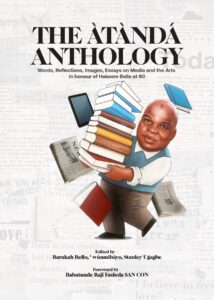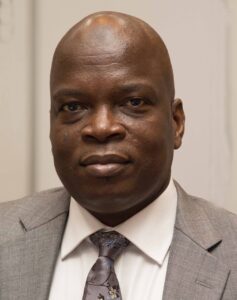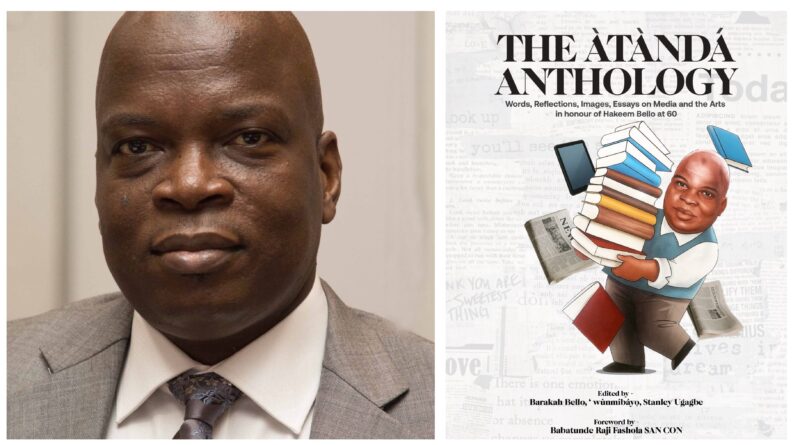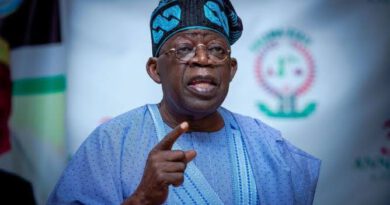FASHOLA, BONUOLA, MEDIA VETERANS, SCHOLARS CELEBRATE HAKEEM BELLO AT 60
• “He resigned his own job to help me start what was then an uncertain political career”, says Fashola

The immediate past Minister of Works and Housing, Mr. Babatunde Raji Fashola, SAN, CON, and media veterans, Lade Bonuola, Eniola Bello, Taiwo Obe as well as prominent scholars, Professors Tunde Akanni, Abdul-Rasheed Na’Allah, Wumi Raji, and Akin Adesokan were among the personalities who have celebrated former Editor of the Daily Times, Mr. Hakeem Babatunde Bello, as he turns 60 today.
Bello, who also served as Special Adviser, Media and Communications to Fashola both as Governor of Lagos State and Minister of Works and Housing, was the toast of the personalities as well as colleagues, family and friends who voiced their tribute to him in “The Àtàndá Anthology”- a rich compendium of tributes, reflections, and essays published in his honour.

In his Foreword to the book, Fashola, who described Bello as a “selfless patriot and a man whose sacrifices defined loyalty and service”, explained, “He resigned his own job to help me start what was then an uncertain political career. Since then, he has made my career his own for two decades and more. This work will explain what sacrifice looks like to those who still lack a definition.”
The former governor, who has worked with Bello for two decades, extolled his humility and deep faith, describing him as a man “of modest needs and content,” and one who “takes parenting and family responsibilities as seriously as he takes his profession.”
“Ultimately, this work is our modest way of celebrating our colleague, friend, brother and a man of many pleasant parts”, Fashola wrote, adding, “The anthology is more than a book; it is a monument to friendship, service, and integrity. This work will explain what sacrifice looks like to those who still lack a definition.”
Indeed, for a man who has spent decades shaping Nigeria’s public communication space with quiet diligence and integrity, Hakeem Babatunde Bello’s 60th birthday is not just a milestone; it’s a celebration of legacy.
That legacy finds its voice in “The Àtàndá Anthology: Words, Reflections, Images, Essays on Media and the Arts,” a newly published collection of tributes, reflections, and academic essays dedicated to the journalist, public communicator, and family man.
Published by Kraft Books Limited, the 324-page volume was edited by Barakah Temitope Bello, Wùnmíbáyô Lúpìtàn, and Stanley Ugagbe.
After setting the tone for the anthology with the deeply personal foreword by Mr. Babatunde Raji Fashola, media veterans likeLade Bonuola, Eniola Bello, Taiwo Obe, Tunde Olusunle, Lasisi Olagunju, Angela Agoawike and Adamson Momoh amongst others in their tributes, also share their recollections of Bello with warmth and admiration with Bonuola describing Bello as the embodiment of discipline and humility.
Mr. Lade Bonuola, pioneer editorial director at The Guardian, praised Bello’s consistency and principles. “… I have interacted with him as my colleague, as an editor and a journalist as well as a public servant. I cannot remember one occasion l felt let down whether by his attitude or action,” Mr Bonuola stated.
To ThisDay’s Managing Director, Eniola Bello, it was a shared bond of brotherly love, which, according to him, stretching over four decades since their days at the University of Ilorin where they studied English together.
Recalling their shared years at the University, Eniola Bello, who wrote passionately about the bond of brotherly love between them, declared, “He and l have shared many things together in the last 40 years. We not only share the same surname, Bello, we both studied English at the Department of Modern European Languages, University of Ilorin, graduating the same year, 1988.”
Describing him as a leader and team player, Bello adds, “He had personal relationships with not a few of our lecturers, having proved himself a leader and team player,” he wrote.
Also in his affectionate tribute, Veteran journalist and mentor, Taiwo Obe, founder of The Journalism Clinic, recalled Bello’s consistency as “a human being of exceptional goodness and patience.”
From the newsroom to the lecture hall, the tributes form a chorus of admiration for a man whose name evokes humility, discipline, and truth.
Prof. Tunde Olusunle, poet, scholar, and Fellow of the Association of Nigerian Authors, reminisced about their early creative years in the University of Ilorin’s Creative Writers’ Club and Ajon Players Drama Troupe.
“Hakeem was a superb and brilliant mind, respected for his sharp intellect, high morality, and quiet confidence,” he wrote.
Prof. Abdul-Rasheed Na’Allah, immediate past Vice-Chancellor of the University of Abuja, described Bello as “a distinguished scholar even in his undergraduate days.”
“He wrote his final thesis on Wole Soyinka and earned the top grade from Professor Niyi Osundare,” Na’Allah recalled. “He was a friend to everyone, kind, calm, and intellectually gifted.”
Other colleagues, including Prof. Akin Adesokan and Prof. Wumi Raji, highlighted Bello’s rare blend of intelligence and grace.
“He stood apart for his quiet brilliance and conviction,” Raji noted. “He is proof that humility and intellect can thrive in one man.”
Beyond the professional tributes, The Àtàndá Anthology captures the warmth of family — the love that shapes Bello’s private world.
His wife, Alhaja Habeebat Bello, describes him as “a responsible husband who never complains but always finds solutions.”
“He’s a man of faith who leads with kindness,” she said. “He never sees any distance too far to visit our children in school.”
Their children, Barakah, Kareemah, Raheemah, and Mubarak, add their voices with touching honesty.
“He’s a role model not because he tries to be one, but because it’s simply who he is,” said Raheemah.
“He sacrificed so much to give us the life he didn’t have,” added Kareemah.
“He’s a man of integrity who always reminds us that honesty is better than comfort,” Mubarak shared.
From his siblings and extended family came equally heartfelt words.
Otitoloju Abiola called him “a first love, best friend, and protector,” while Alhaja Muinat Bello, Deputy Director at NUPRC, hailed him as “a compassionate and inspiring guru in journalism.”
Prof. Mopelola Omoegun, Vice Chancellor, Monarch University and his in-law, described him as “a man who carries responsibilities with grace, unassuming but dependable.”
The second half of The Àtàndá Anthology transitions from personal recollections to intellect, turning from tributes to essays that deepen the book’s relevance as a scholarly resource.
One standout paper, “Fake News, Cyberbullying, and Hate Speech: What Is It and How Do We Deal with It?” by Mr. Chukwudi Enebeli, SAN, explores the challenges of today’s digital media space and the urgent need for responsible communication.
“Freedom of expression must not be weaponised,” he cautions. “The new media environment demands balance, laws guided by ethics, and expression guided by empathy.”
His essay has earned praise for providing both a legal and moral framework for confronting online misinformation, a theme that resonates deeply with Bello’s own ideals of ethical journalism.
Other notable essays include:
•”Television as a Cultural Force: Evolution and Social Impact in Nigeria” by Nwani Chidi Joseph, exploring how television shapes social consciousness.
• “Representation of Women and Minorities in Contemporary Media,” by Akumadu Lucy Obiageri, which advocates inclusion and fairness in media narratives.
• “Social Media and the Rise of Citizen Journalism,” by Stanley Ugagbe, analysing how the smartphone era empowers the public and challenges professionals.
• “The Ethics of Data Collection and Privacy in Digital Media,” by Ola Olusegun Anthony, calling for a rights-based approach to digital privacy.
Each essay, the editors note, reflects Bello’s lifelong commitment to truth, education, and the human side of communication.
“Our father believes knowledge must serve people,” said Barakah Temitope Bello. “That belief guided our choice of essays and contributors. The book had to reflect his values: clarity, fairness, and service.”
Ultimately, “The Àtàndá Anthology,” is more than a birthday keepsake. It is a living record of influence, a collection that shows how quiet service, done faithfully, can touch countless lives.
Its title, Àtàndá, meaning “one who spreads light” in Yoruba, perfectly captures the spirit of the man it honours: a communicator who uses his words to enlighten, not to divide; to build, not to boast.
“This book is our modest way of sharing his light with others,” said co-editor Wùnmíbáyô Lúpìtàn. “It reminds us that humility and intellect are still virtues worth celebrating.”
As one of his protégés summed it up so simply: “If journalism is a calling, then Hakeem Bello has answered it with grace, purpose, and quiet distinction.”
Beautifully woven with heartfelt tributes and insightful essays, The Àtàndá Anthology does more than honour a man; it invites us to reflect on journalism, ethics, and leadership in our time.
In celebrating Hakeem Bello at 60, it celebrates the timeless values he embodies: truth, service, and the steady light of a life devoted to others.




